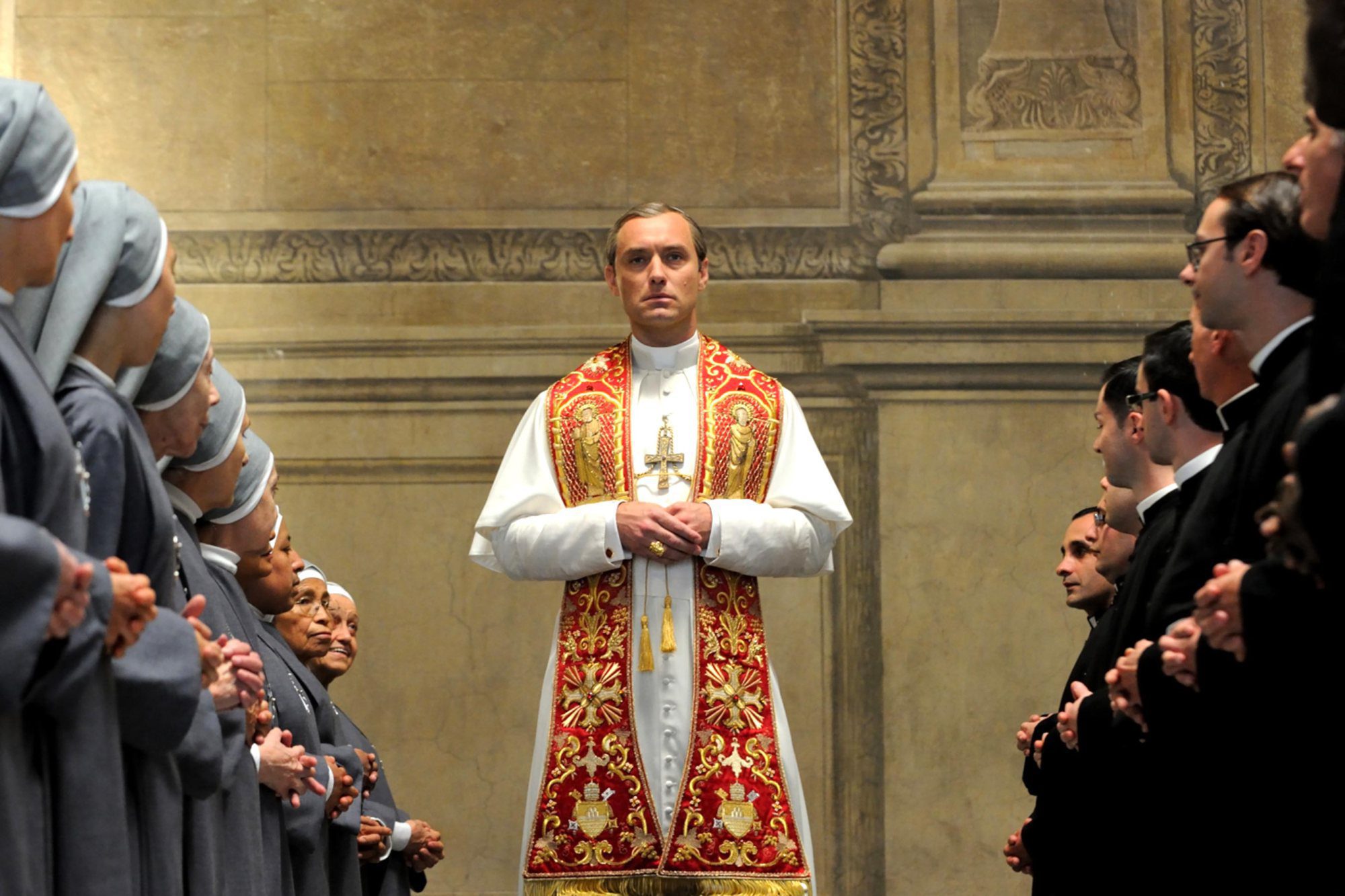The Young Pope is on a wavelength that not everyone will be tuned to, and that’s okay. The show is purposely off-putting; it opens with a dream sequence and feels like one throughout “First Episode.” Jude Law plays the title character like a devout megalomaniac. There’s a lot here that could turn off viewers. I’m not one of them. The Young Pope is completely in my wheelhouse. I found it captivating and even haunting, not only in spite of its flaws (of which there are few) but because of them. In many ways it reminded me of Eyes Wide Shut, an ambitious, flawed film about which I never formed a concrete opinion, yet I find it on my mind once a week or so. The Young Pope is delirious in the same way as Kubrick’s film – and make no mistake, this show is fucking crazy, too. I loved it.
“First Episode” begins with Lenny Belardo (Law) crawling his way out from under a massive pyramid of CGI babies. Read that sentence again. Somehow The Young Pope ramps up the craziness even further, as Lenny drifts (literally) through a sea of cardinals, monsignors, archbishops, and nuns, their robes and miters making the halls of the Vatican awash with color. He gives his first homily, wherein he espouses the importance of harmony and of play, before saying that Catholics need to support gay marriage, abortion, and suicide; have sex out of wedlock; let nuns perform Mass; even get abortions. It’s a jaw-dropping moment, which director/showrunner Paolo Sorrentino (who won a Best Foreign Language Film Oscar for The Great Beauty) punctuates with a ’70s-style zoom on Lenny and three cardinals fainting simultaneously. Yes, there are sight gags, and yes, a bell tolls when they faint. The fact that this homily is a dream sequence does little to diminish its power, because it tells us so much about Pope Pius XIII.
By his own admission, Lenny is “irritable and vindictive”; one of his first scenes has him demanding a Cherry Coke Zero for breakfast (when offered a Diet Coke, he says “Let’s not utter heresies”), and dressing down an aged nun who had the temerity to kiss his cheek and not his ring. In many ways, Law seems to be channeling Kevin Spacey’s House of Cards character, Frank Underwood, but without any of Spacey’s scenery chewing. Law is no stranger to playing weirdos (his murderous photographer in Road to Perdition is still my favorite), and Lenny Belardo might be his finest work yet. Somehow in a show this nuts, he manages the right balance of restraint and abandon. At one point, he looks a cardinal dead in the eye and says “There’s a new Pope” before taking a drag of his cigarette, and I think, taking the title at face value, that’s how a lot of people thought the show would go. But crazy moments like that are balanced out by his confession – which Lenny insists was a joke, but it’s hard to tell – that he doesn’t believe in God. One hour in, and Law and Sorrentino have crafted a wonderfully enigmatic, entrancing character (bonus: Law’s American accent has drastically improved since eXistenZ).
But don’t be fooled: The Young Pope might be aggressively weird, but it’s still beautiful. I know they didn’t shoot this in the Vatican, so this is either one hell of a set or the best green screen technology I’ve seen in years. Every scent of HBO’s money is evident on the screen. Sorrentino brought his Great Beauty composer and cinematographer, Lele Marchitelli and Luca Bigazzi, to HBO with him, and the show is well-served by both of them. Marchitelli’s score is at turns playful, mysterious, and imposing, with graceful piano and thundering tympani – a perfect sonic accompaniment to the mercurial Lenny Belardo. Bigazzi has a painter’s eye; many of his shots reminded me of the late Vittorio Storaro, who made Apocalypse Now look like a William Blake poem. Seemingly out of tribute to the setting, Bigazzi shoots his scenes like he’s staging a Renaissance painting; even shots as seemingly mundane as someone bringing Lenny a pack of cigarettes are commanding.
What surprise me most about The Young Pope, a show that traffics in unpredictability, was the reverence it clearly holds for the office. This is not a satire of the papacy, and nowhere is that clearer than in a monologue delivered to Lenny by Sister Mary (Diane Keaton), in which she emphasizes the importance of his position, repeatedly reminding him that he is now responsible for one billion Catholics, before ending by calling him “the father and mother of the entire Catholic church.” All this time, curtains flow behind her, making her look angelic and earthbound at once. The papacy is never depicted as a joke; Law and Sorrentino give the office the weight it deserves, and Law, although soft-spoken, makes a striking impression.
The Young Pope is strange, dreamlike, funny, and ultimately beautiful. The mysteries of faith are never far from the surface; one cardinal describes the Holy Spirit as not stupid, but “ironic and cunning,” and that could very well work as a description of the show.






